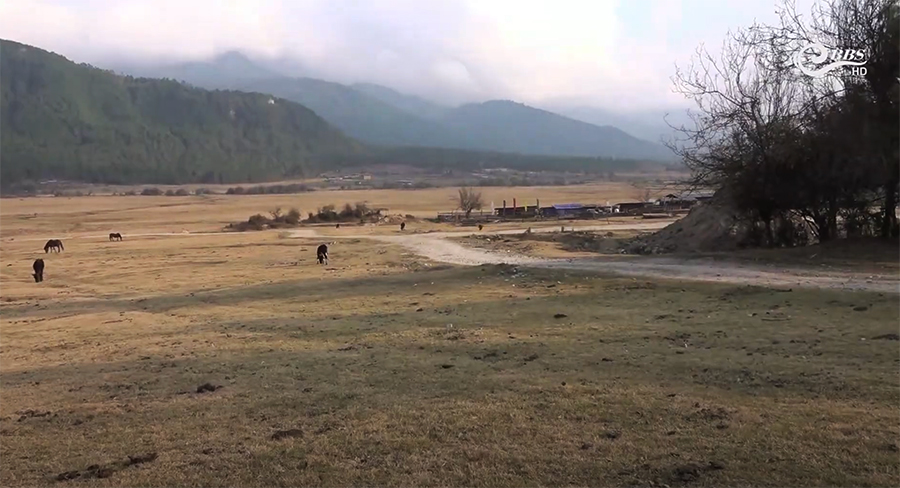 The people of Khotokha in Wangdue Phodrang’s Bjena Gewog eagerly anticipate the transformation of their area into a tourist destination. A feasibility study showed the valley’s potential for eco-tourism. If approved, the valley will be developed into a Community-Based Eco-Tourism Camp. While the valley serves as a crucial winter habitat for black-necked cranes, the local community is eager to transform the area into a tourist destination without disrupting its ecological balance.
The people of Khotokha in Wangdue Phodrang’s Bjena Gewog eagerly anticipate the transformation of their area into a tourist destination. A feasibility study showed the valley’s potential for eco-tourism. If approved, the valley will be developed into a Community-Based Eco-Tourism Camp. While the valley serves as a crucial winter habitat for black-necked cranes, the local community is eager to transform the area into a tourist destination without disrupting its ecological balance.
 Nestled in the serene valley surrounded by majestic mountains and a pristine environment, Khotokha’s untouched landscape offers a glimpse of nature’s unspoiled beauty and rich ecosystem.
Nestled in the serene valley surrounded by majestic mountains and a pristine environment, Khotokha’s untouched landscape offers a glimpse of nature’s unspoiled beauty and rich ecosystem.
Driven by public interest, a feasibility study for a Community-Based Eco-Tourism Camp was conducted earlier this month with community participation. The study confirmed the area’s potential for tourism.
 With no significant history of tourism, these landscapes hold immense potential for sustainable eco-tourism. Besides its natural beauty, Khotokha is home to ancient monasteries, sacred sites, and historical landmarks.
With no significant history of tourism, these landscapes hold immense potential for sustainable eco-tourism. Besides its natural beauty, Khotokha is home to ancient monasteries, sacred sites, and historical landmarks.
Local consultations were held with key stakeholders, including gewog and district administration officials, community members, and sector representatives. The community welcomes the initiative with enthusiasm and pride.
“We were all excited as soon as we heard the news about Khotokha becoming a tourist destination. Our excitement comes from the fact that our community will be able to maintain good health and hygiene. Additionally, we will no longer have to travel far to the market to sell our products. We can sell them right at our doorstep,” said Tenzin Chophel, a resident.
“There is great potential for generating a good income through tourism in our area. For instance, even setting up a guesthouse can become a source of income. I find this incredible. As a result, everyone in our community is happy and eagerly waiting for tourism-related activities to begin. We have seen other places develop through tourism, and we hope to improve our livelihoods in the same way,” said Lhatu, another resident.
So far, the district administration has received four proposals for homestays and one proposal for a guesthouse in the community.
“Currently, our primary income source is potato farming. Tourism would greatly benefit our community. Some neighbours plan to set up homestays, and if they succeed, I am considering starting one too,” said Wangchuk, a resident.
“We have high expectations for tourism activities if the government plans to initiate them in the Khotokha area. We would be delighted if this tourism initiative is started as soon as possible. We understand that implementing tourism activities would bring significant changes to our community,” said Dorji Wangdi, a resident.
 However, the core area of the valley falls under the Ramsar-protected area and serves as a winter habitat for black-necked cranes. The district administration plans to collaborate with the Department of Tourism, Royal Society for Protection of Nature, Department of Forest and Park Services, and other stakeholders to ensure tourism development does not affect this crucial habitat.
However, the core area of the valley falls under the Ramsar-protected area and serves as a winter habitat for black-necked cranes. The district administration plans to collaborate with the Department of Tourism, Royal Society for Protection of Nature, Department of Forest and Park Services, and other stakeholders to ensure tourism development does not affect this crucial habitat.
An official from the district administration confirmed that development work will proceed with careful consideration of environmental and cultural significance.
“To develop Khotokha valley into a tourism destination is actually driven by the local community. So, this approach is most probably going to take note of all the environmental and cultural aspects, and we will be mindful that we do not disturb the protected sites. We will adhere to cultural conservation and preservation regulations,” said Sarita Gurung, the Offtg District Economic Development Officer, Wangdue Phodrang.
Site development will include trail construction, homestays, hotels, and a black-necked crane observation centre.
The project will be funded under the Local Area-Based Potential Economic Development initiative of Europe, with technical support from Particip and Helvetas Bhutan. Officials expect to complete the project and make it functional by next year. With road access, Khotokha is approximately 30 kilometres from the district centre.
 As Khotokha prepares for this transformation, the community remains committed to balancing economic opportunities with environmental preservation.
As Khotokha prepares for this transformation, the community remains committed to balancing economic opportunities with environmental preservation.
Changa Dorji, Wangdue Phodrang
Edited by Kipchu









